Finding the best business credit card sign-up bonus can feel like a full-time job. With so many offers, how do you know which is best for you? We’ve rounded up the best offers to help make your decision easier.
Best Business Credit Card Sign-up Bonuses
Find our round-up of the top banks offering business credit card bonuses below.
- Chase Ink Business Preferred®
- Capital One Venture X Business
- Chase Ink Business Unlimited®
- Chase Ink Business Cash®
- Capital One Spark Miles for Business
- American Express Business Platinum Card®
- United℠ Business
1. Chase Ink Business Preferred® 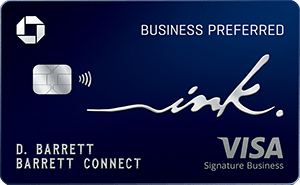
- Annual fee: $95
- Sign-Up Bonus: 90,000 Bonus Points
The Chase Ink Business Preferred® credit card pays business owners 3x points per $1 spent in categories including shipping, advertising, internet, cable, phone services, and travel on up to the first $150,000 spent per year.
Cardholders also earn one point per dollar spent on everything else. As a bonus, business owners can also earn 5x points on Lyft rides through March 2025.
New cardholders can earn a bonus of 90,000 points if they spend $8,000 on purchases in the first three months. If you turn in the points for travel through Chase Travel℠, that’s the equivalent of $1,125 or $900 for all other cashback redemptions.
Check out the benefits of the Chase Ink Business Preferred® card:
- Points are worth 25% more when you redeem for travel through Chase Travel℠
- Employee cards at no cost
- No foreign transaction fees
- Trip coverage, including trip cancellation, trip interruption, and auto rental coverage
- Roadside dispatch
- Up to $1,000 in cellphone protection for you and your employees if you pay your bill with your Chase card
- Protection on items bought with the card up to $10,000 for up to 120 days against theft or damage
- One-year extended warranty on items purchased with the card
2. Capital One Venture X Business 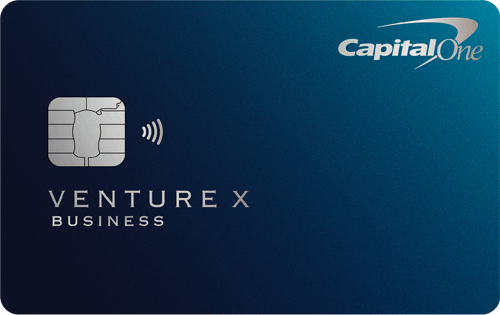
- Annual fee: $395
- Sign-Up Bonus: 150,000
The Capital One Venture X Business credit card is a pay-in-full credit card with great benefits for business owners. Earn 2x miles for every dollar spent, or 5x on flights & vacation rentals and 10x on hotels & rental cars booked through Capital One Travel.
Cardholders also earn a $300 annual credit when booking through Capital One Travel and 10,000 bonus points on their anniversary date each year.
Capital One offers one of the best business card sign-up bonuses, too, with a bonus of 150,000 miles once you spend $30,000 in three months. This is obviously suited for established businesses with high expenses.
The Capital One Venture X Business card benefits include:
- Flexible redemption options
- Get credit for TSA PreCheck® or Global Entry
- Access to 1,300 airport lounges
- Free employee cards
- No pre-set spending limit
- Year-end summaries
3. Chase Ink Business Unlimited® 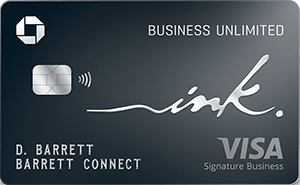
- Annual fee: $0
- Sign-Up Bonus: $750
The Chase Ink Business Unlimited® credit card pays 1.5% back on all business purchases. Through March 2025, cardholders can earn 5% back on all Lyft rides, and the card has no annual fee.
The spending limits for the business credit card sign-up bonus are low for this card at only $6,000, and you can earn $750 bonus cash if you do so within three months.
The benefits of the Chase Ink Business Unlimited® card include:
- Free employee cards
- Many options for redemption, including cash, gift cards, and more through Chase Ultimate Rewards®
- Auto rental collision coverage
- Travel and emergency assistance referrals
- Roadside emergency service
- Purchase protection on purchases up to $10,000 for up to 120 days made with your Chase card
- Extended warranty on purchases made with your Chase card
4. Chase Ink Business Cash® 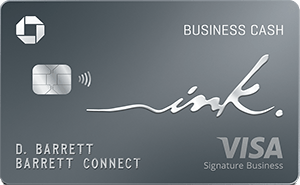
- Annual fee: $0
- Sign-Up Bonus: up to $750
The Chase Ink Business Cash® credit card doesn’t have an annual fee and pays 5% back on office supplies, internet, cable, and phone services on up to $25,000 spent per year.
You can also earn 2% back on combined gas and restaurant purchases on the first $25,000 each account anniversary year. It also pays 1% on everything else, with no limit.
Like most Chase cards, you can earn 5% back on all Lyft rides through March 2025.
Chase makes it easy to earn a credit card sign-up bonus with this card, requiring spending of only $3,000 on purchases in the first three months to earn $350 and an additional $400 if you spend $6,000 in the first six months.
In addition, the Chase Ink Business Cash® card offers:
- Free employee cards
- Many options for redemption through Chase Ultimate Rewards®
- Auto rental collision coverage
- Travel emergency services
- Roadside dispatch services
- Purchase protection up to $10,000 for 120 days
- Extended warranties on purchases made with your Chase card
5. Capital One Spark Miles for Business 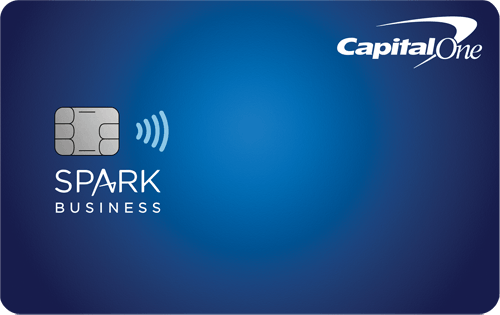
- Annual fee: $95, but $0 for the first year
- Sign-Up Bonus: 50,000 miles
The Capital One Spark Miles for Business credit card pays a great rate of 2x miles per dollar spent on all business purchases, plus 5x miles per dollar spent on hotel and rental cars. You must use Capital One Travel to earn the bonus.
New cardholders can earn a 50,000-mile bonus if they spend $4,500 on purchases in the first three months. If you redeem the miles through Capital One Travel, you’ll maximize your earnings.
Other benefits of the Capital One Spark Miles for Business card include:
- Up to $120 credit for TSA PreCheck® or Global Entry
- Redeem points how you want, including transferring them to 15+ travel partners
- $0 fraud liability
- Year-end summaries for easier tax preparation
- Ability to assign an account manager to handle payments and issues
- Access to purchase records to download into popular software programs
6. American Express Business Platinum Card® 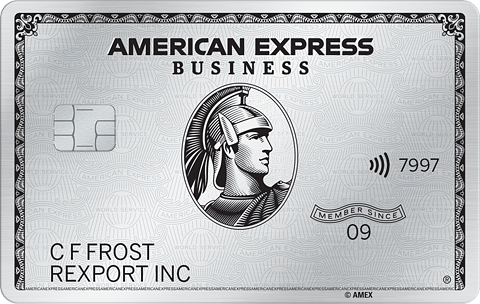
- Annual fee: $695
- Sign-Up Bonus: 150,000 Membership Reward Points
The American Express Business Platinum Card® pays 5x on flights and hotels booked through AmexTravel.com. And it pays 1.5x points on material and hardware supplies, electronics, software, and shipping.
Cardholders also earn 1.5x points on purchases of $5,000 or more; otherwise, 1x points on all other purchases.
The American Express Business Platinum Card® pays a 150,000-point bonus if you spend $20,000 in the first three months. This card is great for established businesses with great credit who spend a lot.
In addition to the above benefits, business owners enjoy:
- $400 back annually on Dell purchases
- $360 back annually for Indeed subscriptions
- $150 back annually for Adobe subscriptions
- $120 back annually for wireless services
- Access to the American Express Global Lounge Collection®
- $200 annually for airline tickets and baggage costs
- Access to fine hotels and resorts
- $189 back for a CLEAR® Plus membership
- Get 35% of points used for travel through AmexTravel.com back
- No foreign transaction fees
- Gold or elite status at many hotels
- Trip cancellation, interruption, and delay coverage
- Baggage insurance
7. United℠ Business
- Annual fee: $99, but $0 for the first year
- Sign-Up Bonus: 100,000 Bonus Miles (Limited Time Offer)
The United℠ Business credit card pays 2x miles on many things, including United purchases, office supplies, gas, dining, rideshare, public transportation, parking, and tolls. It also pays 1x points on all other purchases.
For a limited time, applicants can earn 100,000 bonus miles if they spend $5,000 in the first three months.
In addition, United℠ Business offers:
- 5,000 bonus miles annually when you have a United℠ Business and personal United credit card
- Two passes to United Club annually
- First bag checked free for you, and a companion
- Priority boarding
- $100 United credit after purchases on seven United flights annually
- 25% off in-flight purchases
- No foreign transaction fees
- Travel coverage, including trip cancellation, interruption, and rental collision damage coverage
- One year free DoorDash Dashpass
- Access to exclusive card member events
- Benefits at luxury hotels and resorts
What Are Business Credit Card Sign-up Bonuses?
A business credit card sign-up bonus is free money offered for new cardholders. If you qualify for the credit card and meet the spending requirements, you may be able to use your earned bonus in several ways. Depending on the bank, you can earn bonus cash as a statement credit, redeem it for other prizes like gift cards, or use it towards travel expenses.
Are Credit Card Sign-on Bonuses Worth It?
When you look for the best business credit card sign-up bonus, you might wonder if it is worth it. After all, you have to spend money to make money. So should you?
The answer depends on your spending habits. If the spending requirements are within the amount you normally spend, then why not earn free money? Most business credit cards have many other rewards, making the card well worth it.
Of course, this is only the case if your rewards far outweigh the annual fee.
Do Credit Card Sign-up Bonuses Count as Income?
Credit card bonuses are not income. Because you must spend money for each bonus to earn it, the IRS considers it a rebate, and you don’t owe taxes. Even though the bonuses aren’t huge, it’s still free money in your pocket.
How To Qualify
Qualifying for the best business credit card sign-up bonus is simple with these steps:
- Research your options and choose the best credit card. Don’t focus only on the bonus but on the card’s cost and overall rewards. Choose the card that will best reward you based on your normal spending
- Apply for the business credit card in your business’s name. Most credit card companies have their applications online and offer instant answers
- Satisfy the spending requirements within the required timeframe. Make sure you don’t have to spend the money in certain categories
- Earn your bonus after satisfying the requirements
What To Consider
Choosing a business credit card is a big decision as it affects your interest rate, rewards, and credit score. Here’s what to consider.
- Watch out for pay-in-full cards: If you want a traditional credit card, read the fine print, or you may be stuck with a card that doesn’t have a credit line but instead expects full payment each month
- Be careful of the spending requirements: Don’t sign up for a bonus that requires more than you normally spend. Putting yourself into debt to get a credit card reward doesn’t make sense
- Consider the rewards offered: Are they something you’ll use? Do you spend money regularly in the categories the card pays cashback for?
- Look closely at the card’s APR if you carry a balance: There’s no reason to spend more money on interest than is necessary
Tips for Maximizing Your Business Credit Card Sign-up Bonus Potential
To get the most out of your business credit card sign-up bonus, consider the following:
- Know the requirements: If you don’t have great credit, don’t waste your time applying for cards with extensive requirements. Stick to the cards with requirements you can meet to avoid getting declined for a card
- Pay attention to the rewards: A quick bonus won’t be as rewarding as ongoing rewards. Pay attention to the categories the card pays a bonus in and how much. For example, if your business spends a lot at office supply stores, look for cards with bonuses in that category
- Know the repayment terms, including the APR: Some cards are pay-in-full, and others have an APR and let you carry a balance. Know the terms and the fees to determine if a card makes sense for your business
- Look for travel benefits if you travel often: Many business credit cards have travel benefits, including bonus rewards for booking travel through their travel portal. Take advantage of the higher offers and maximize your rewards
Frequently Asked Questions
Finding the best business credit card sign-up bonus can be hard work. Here are some additional questions about business credit card bonuses.
Why Should Businesses Consider Credit Cards With Sign-up Bonuses?
Sign-up bonuses are like free money, and they don’t get taxed. In addition, most business credit cards offer ongoing and annual rewards, helping you make the most of your business’s finances and rewards.
Do Business Credit Cards With Sign-up Bonuses Have Annual Fees?
Some credit card companies charge an annual fee, but not all do. If you are trying to keep costs down and want a simple credit card, there are options for no-annual-fee business credit cards that pay bonuses.
Can I Hold Multiple Business Credit Cards With Sign-up Bonuses?
You are free to own as many business credit cards as you qualify for; there isn’t a limit. However, keep your credit cards to a minimum to avoid getting in over your head in debt or ruining your business credit. If you apply for multiple cards, wait at least a few months between each application.
How Do I Maintain a Good Business Credit Score When Using a Business Credit Card With a Sign-up Bonus?
The key to a good credit score with a business credit card is to make your payments on time and keep your credit utilization at 30% or less of the credit line. These two factors will help increase your credit score.





No comments yet. Add your own